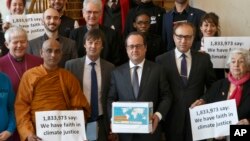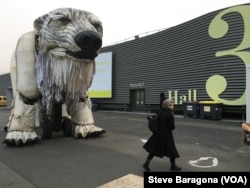With less than 48 hours to go before a Friday deadline, delegates of 196 countries meeting in a Paris suburb are in a race to reach a wide-reaching climate agreement, but hurdles over money and targets remain large.
A 29-page draft of the agreement released on Wednesday shows differences remain substantial, especially on key questions involving the responsibility of richer nations to fund climate-change programs for poorer countries.
Core areas of dispute also include the demand by developing nations for an agreement – and corresponding commitments – to prevent global temperatures from rising a maximum of 2 degrees Celsius over pre-industrial levels.
Industrialized nations that still depend largely on coal and other fossil fuels are arguing for a goal of 1.5 degrees. The less ambitious target would enable them to ease dependence on fossil fuels more gradually and lessen the trauma to their economies.
'Decisive moment'
French President Francois Hollande called these last few hours “a decisive moment.”
French Foreign Minister Laurent Fabius, in presenting a draft agreement that had been reduced by 14 pages from Saturday, said progress has been made. But he said “nothing is agreed until everything is agreed” and he tasked delegates with coming up with a further improved agreement by Thursday afternoon.
In addition to calling for more ambitious goals, developing nations are asking for funding from developed, high-polluting countries to pay for the transition to green energy, technology assistance, and compensation for damage done by climate-related natural disasters.
U.S. Secretary of State John Kerry urged delegates to use this opportunity to finalize an “ambitious, inclusive, and durable global climate agreement,” saying “damage is going to increase exponentially” if too many people wait for “someone else to take responsibility.”
Kerry said Washington will not leave the most vulnerable nations afflicted with extreme weather and other effects of climate change “to, quite literally, weather the storm alone.”
The top U.S. diplomat said the United States has committed to double its investments from $400 million to $800 million over the next five years to help poorer countries adapt.
But the delivery of that assistance may be in question as members of the Republican-led U.S. Congress have indicated they plan to block the funding.
Skepticism
That prospect has fueled skepticism among delegates of developing countries here in Paris, who believe whatever agreement is reached this week will be a repeat of unfulfilled promises already seen at previous climate summits.
Marshall Islands Foreign Minister Tony De Brum met with Republican U.S. congressional staffers at the climate conference and said they him “don't be so sure of what you're getting in Paris because we're not sure it's going to fly at home.”
“But it has to fly,” De Brum said. “There has to be some commitment on the part of everyone. It does not matter what party they belong to. This is a human right, a human survival issue.”
The climate conference’s opening last week was energetic, with U.S. President Barack Obama and other world leaders – in the largest-ever gathering of heads of state – urging delegates to put aside differences and reach an agreement.
The momentum has continued and few doubt that an agreement will be reached on Friday. How strong that agreement will be is another question.
The trimmed-down draft accord that delegates are discussing Thursday does not address the questions of global warming targets, nor does it resolve the issue of how much responsibility rich countries should bear for climate funding, or how that funding will be obtained.
With these key issues absent from the agreement, observers say the best that could be expected on Friday is an accord that reflects little more than a consensus that all parties want to stop global warming.
How they do it would then be a matter for the next summit.















